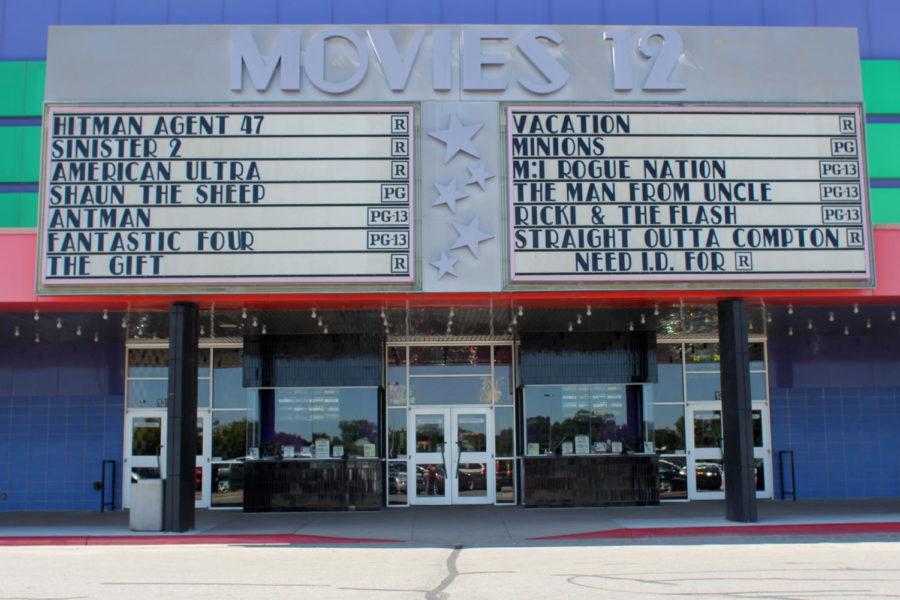Ward: Movie theater security measures must be implimented to prevent more fatalities
Columnist Ward believes that movie theaters must implement more security measures in order to prevent further attacks.
August 26, 2015
When I walk into work, I often equate it to voluntarily entering an environment that contains nine individual little worlds. Each mini-universe contains its own version of reality with different settings, cast of characters and levels of realism. To add another level of intrigue, these worlds will be visited by hundreds of people a day. This is why I love working at a movie theater. At any given time I meet people who have been counting down the days to get a killer adrenaline rush, witness a storybook romance or be thoroughly freaked out by the newest horror flick.
But I should clarify that these moviegoers want to be horrified by the fictional story being projected onto the screen in front of them. They do not want to actually be running for their lives in terror because a maniac has opened fire into a dark, crowded theater where there are few exits.
This summer, two unrelated theaters experienced tremendous tragedy at the hands of deranged individuals who took advantage of the movie-viewing industry’s biggest and most fatal flaw — the fact that security is just about nonexistent.
Two separate incidents of theater violence took place resulting in the death of four individuals and the injuring of 12 others. The first and most deadly of the two events occurred in Lafayette, La., during a July 23 showing of Amy Schumer’s comedy “Trainwreck.” Less than two weeks later, on Aug. 5 in a Nashville theater, a man armed with an ax, pepper spray and an airsoft pellet gun assaulted patrons during a showing of “Mad Max: Fury Road,” resulting in the assailant’s death at the hands of officers on the scene.
It absolutely astonishes me that these events were even able to take place, especially given the nature of today’s high-tech society — as well as how well equipped just about all other public venues are. In my 19 years, I have yet to go to a concert in an arena or a baseball game in a big stadium where my bags were not checked and metal detectors were not used. Basically, these kinds of security measures have come to be expected by those attending either of these types of events, and I strongly feel that movie theaters should be no different.
To this some may issue the argument that movie theaters don’t draw in enough of the public to warrant any type of security methods. To that I ask: Who has the authority and wants to shoulder the responsibility of deciding the lives of concert attendees are worth protecting while moviegoers are not? I personally cannot stand the idea of sitting idly by while people are dying because some psychopath figured out that moviegoers are sitting ducks that are paying no attention to what is happening within the theater itself.
But perhaps the most voiced concern about implementing what I consider to be completely necessary security measures, is simply the funding, or lack thereof, that this change would require. It has become common knowledge at this point that theater attendance has been steadily declining in recent years which has ultimately led to lower revenue.
The theater industry brought in $10.4 billion in 2014, which was down 5 percent from the previous year, and chances are this trend will continue — although I hope not — simply based on the nature of the film-viewing industry today. But to be frank, all of these numbers and the state of the industry are beside the point. People need and want to feel safe when they sit down to enjoy a feature film. They shouldn’t have to be sitting on the edge of their seat because they fear what is going on inside the theater rather than on the screen.
To address a much more positive set of numbers, people are willing to pay a little extra to implement these measures. A study was recently conducted by C4 Insights pertaining to the public’s thoughts on increasing ticket prices to cover the cost of security increases. Out of the 500 people polled, 48 percent agreed that paying at least $1 more in ticket prices would be worth the installation of metal detectors or bag checkers.
The decision is clear, and the public has spoken. Taking steps to increase movie theater safety is not only necessary but supported ethically and monetarily by the public. There is no reason, given these truths, that moviegoers should be left in these mini-universes to fend for themselves.







